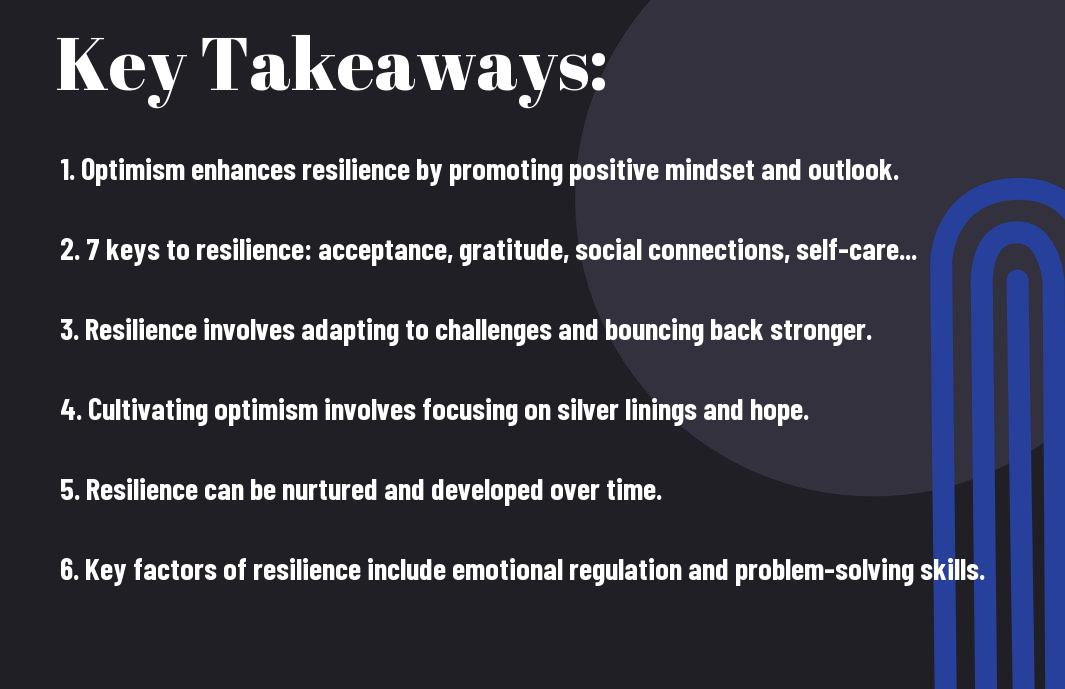Can Cultivating Optimism Lead To Greater Resilience? What Are The 7 Keys To Resilience?
Resilience is a crucial trait that can help individuals navigate through life’s challenges with strength and grace. Cultivating optimism, in particular, has been shown to enhance resilience and equip individuals with the tools to bounce back from setbacks. Understanding the key components of resilience is imperative for harnessing its power in our own lives. In this blog post, we will explore the relationship between optimism and resilience, and explore the 7 keys that can help foster resilience in the face of adversity.
Key Takeaways:
- Cultivating optimism: This can lead to greater resilience by helping individuals bounce back from setbacks and challenges more effectively.
- Seven keys to resilience: These include mindfulness, self-compassion, self-awareness, social support, adaptability, purpose, and gratitude.
- Mindfulness: Being present in the moment can help individuals better cope with stress and build resilience in the face of adversity.
- Social support: Having a strong network of friends, family, and community can provide emotional and practical support during difficult times.
- Gratitude: Focusing on the positive aspects of one’s life and expressing gratitude has been linked to increased resilience and overall well-being.


The Psychology of Optimism
Definition and Theory of Optimism
Any discussion on optimism must begin with understanding its definition and theoretical underpinnings. Optimism can be defined as a mental attitude characterized by a hopeful and positive outlook on future outcomes, believing that good things will happen in one’s life. This perspective is grounded in the theory that individuals who possess optimistic beliefs are more likely to persevere through challenges and setbacks, ultimately leading to greater resilience.
The Cognitive Processes Behind Optimism
Processes that govern optimism are rooted in cognitive psychology, specifically focusing on how individuals interpret and perceive events. With a tendency to attribute positive events to internal, stable, and global factors, while negative events are seen as external, unstable, and specific, optimistic individuals shape their thinking patterns to support positive outcomes. This cognitive bias allows them to maintain hope and motivation, even in the face of adversity, contributing to their overall resilience.
The Relationship Between Optimism and Resilience
How Optimism Supports Resilience
For individuals striving to build resilience, cultivating optimism plays a crucial role. Optimism acts as a protective shield during challenging times, allowing individuals to maintain a positive outlook and belief in their ability to overcome obstacles. This mindset enables individuals to bounce back from setbacks, view challenges as temporary, and see opportunities for growth and learning in adversity.
Research Findings on Optimism and Resilience Dynamics
One of the key findings in research on optimism and resilience dynamics is the significant impact of positive thinking on an individual’s ability to navigate and thrive in the face of adversity. Studies have shown that individuals with an optimistic outlook are more likely to exhibit resilience in the face of stress, trauma, and setbacks. Optimism fosters adaptive coping strategies, enhances problem-solving skills, and promotes mental well-being in individuals facing adversity.
Optimism serves as a foundation for resilience, empowering individuals to approach challenges with a proactive and hopeful attitude. It allows individuals to shift their focus from obstacles to opportunities, enabling them to persevere in the face of adversity and emerge stronger on the other side.
The 7 Keys to Resilience
Key 1: Embracing a Positive Outlook
On the journey to resilience, cultivating a positive outlook is crucial. Not to be mistaken for blind optimism, embracing a positive outlook involves acknowledging challenges while maintaining a hopeful attitude towards overcoming them.
Key 2: Building Strong Social Connections
Strong social connections play a vital role in building resilience. A solid support network of friends, family, or colleagues provides a safety net during tough times, offering emotional support, advice, and a sense of belonging.
A robust social support system is key to bouncing back from adversity, as it fosters a sense of community and helps individuals feel more understood and less alone in facing life’s challenges.
Key 3: Developing Emotional Insight
Outlook
Connections
Key 4: Fostering Acceptance and Flexibility
Resilience
Understanding
Key 5: Setting Realistic Goals and Taking Action
Social
With
Key 6: Cultivating a Sense of Purpose
Cultivating
For instance
Key 7: Learning from Setbacks and Challenges
Embracing
Developing
Practical Strategies to Cultivate Optimism and Resilience
Cognitive-Behavioral Approaches
To develop optimism and enhance resilience, cognitive-behavioural approaches can be highly beneficial. By challenging negative thoughts and beliefs, individuals can reframe their thinking patterns in a more positive and constructive manner. This involves recognizing cognitive distortions, such as catastrophizing or black-and-white thinking, and replacing them with more balanced and realistic perspectives.
Mindfulness and Stress Reduction Techniques
Cultivating mindfulness through practices like meditation, deep breathing exercises, and yoga can significantly reduce stress and enhance resilience. Mindfulness involves being fully present in the moment, without judgment or overthinking. By incorporating these techniques into daily routines, individuals can cultivate a greater sense of calm, heightened self-awareness, and improved emotional regulation.
Regular practice of mindfulness has been shown to lower cortisol levels, decrease anxiety, and improve overall well-being. By developing the ability to stay grounded and centred, individuals can face challenges with greater ease and bounce back from adversity more effectively.
Incorporating mindfulness and stress reduction techniques into daily life can help build a strong foundation for resilience, enabling individuals to navigate difficulties with a greater sense of courage and perseverance.
Conclusion
Conclusively, cultivating optimism can indeed lead to greater resilience. By adopting a positive outlook, individuals can face challenges with a more resilient attitude and bounce back from setbacks more effectively. The 7 key factors to resilience include emotional awareness, self-regulation, optimism, mental agility, strengths of character, connection, and seeking purpose. By incorporating these elements into one’s mindset and daily practices, individuals can enhance their ability to overcome adversity and thrive in the face of challenges.
FAQ
Q: Can cultivating optimism lead to greater resilience?
A: Yes, cultivating optimism can lead to greater resilience. Optimism allows individuals to maintain a positive outlook, which can help them navigate challenges and setbacks more effectively.
Q: What are the 7 keys to resilience?
A: The 7 keys to resilience are self-awareness, self-regulation, optimism, mental agility, strength of character, connection, and reaching out.
Q: How does self-awareness contribute to resilience?
A: Self-awareness is crucial to resilience as it allows individuals to recognize their emotions, thoughts, and behaviours, thus enabling them to better understand and manage their responses to adversity.
Q: Why is connection important for resilience?
A: Connection is important for resilience as having a support system and strong social connections can provide emotional support and valuable resources during challenging times, strengthening one’s ability to bounce back.
Q: How can one cultivate optimism for greater resilience?
A: One can cultivate optimism for greater resilience by practising gratitude, reframing challenges as opportunities for growth, setting realistic goals, and surrounding oneself with positive influences.